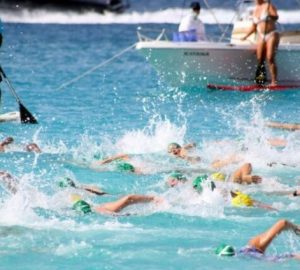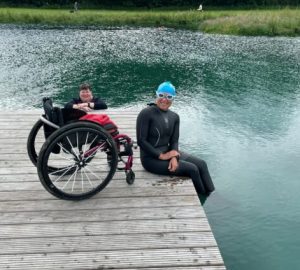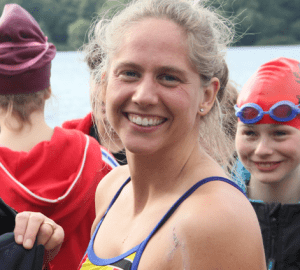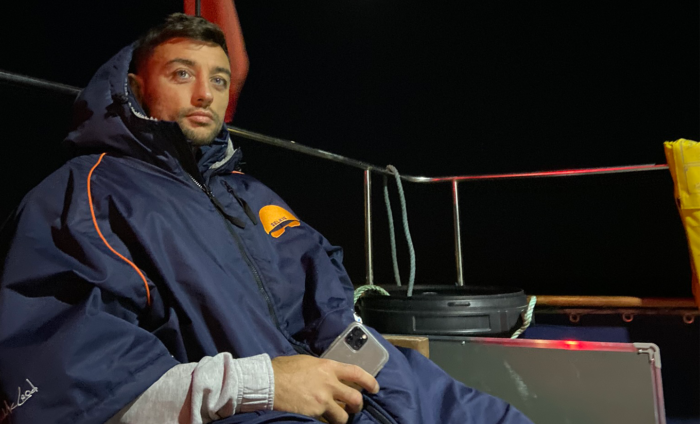
“I didn’t make it across the English Channel – but training for it bought me time”
Training alone for hours on end in cold, rough seas, battling currents, swells and jellyfish, all in the knowledge that you’ll have to wake up the following day and do it all over again.
For most people, the life of an aspiring English Channel swimmer is not one they would wish to lead.
But for 32-year-old Lee Brogan, it was a lifeline.
“I wouldn’t say that training to swim the Channel has given me a new lease of life,” says the personal trainer from Wirral. “But it has bought me the time I needed to get better. I am a different person now.”
Two years ago, Lee was suffering from suicidal thoughts and depression.
“I felt as low as you could feel,” says the father of two. “There was no reason for me to feel that down and depressed, but I couldn’t get out of that slump. I got to a point where I no longer wanted to exist.”
Despite now being willing to share his experiences, it was only recently that Lee has felt able to talk openly about how he was feeling.
“There’s still such a stigma around mental health,” he says. “Although it is getting better, and people are starting to talk about it, I think men still find it really difficult to share when it’s time to talk.
“If I have to share my experience now, then that is something I am willing to do in order to be able to help people talk about it.”
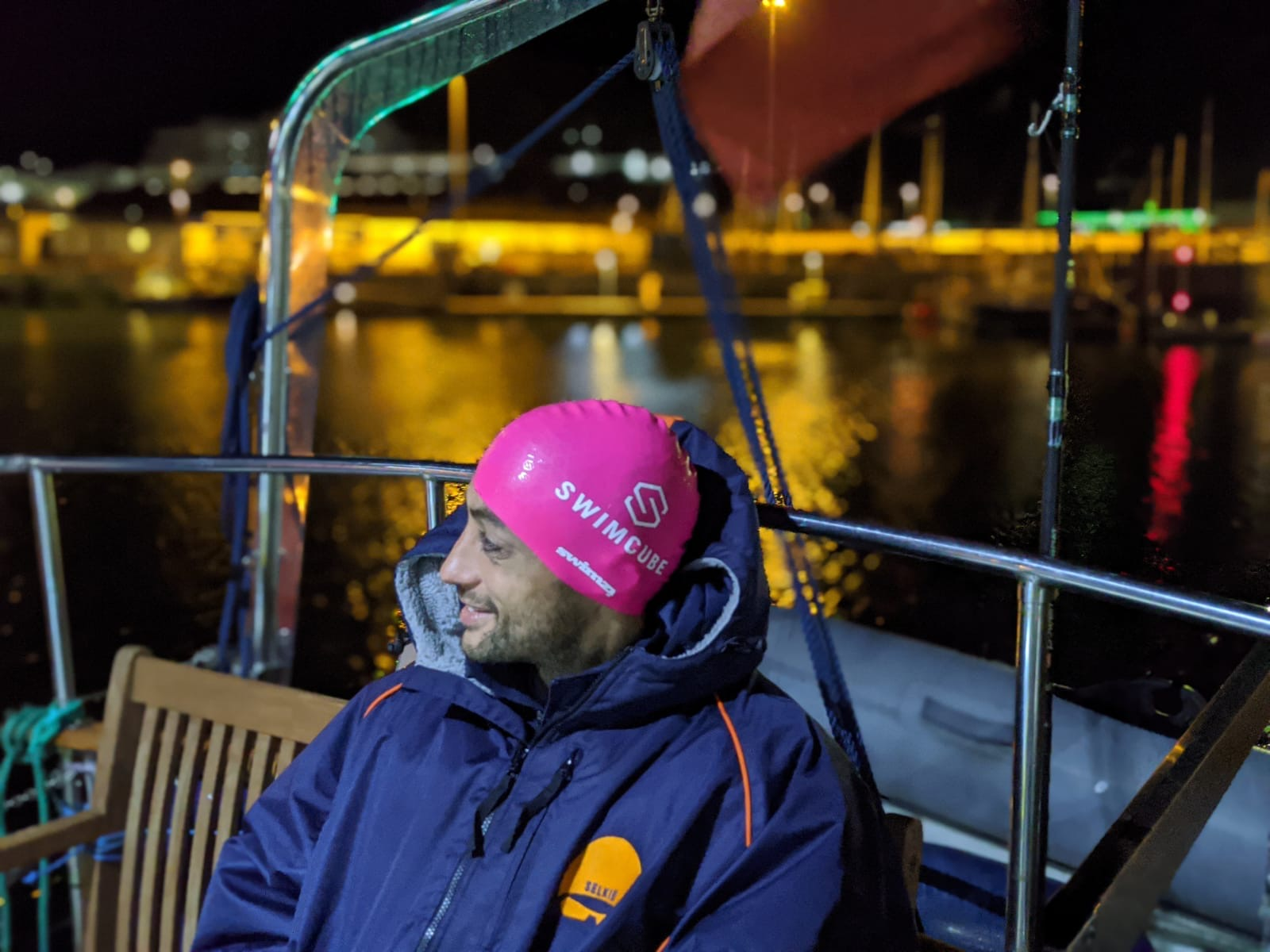
Lee was a guest on Gym Streak podcast in March, where he spoke about swimming the Channel, training and mental health
Lee was lucky enough to speak to a therapist about his mental health, and has since chosen to fundraise for Wirral Mind – a mental health resource available throughout Wirral and Merseyside.
His decision to swim the Channel in 2018 was the next step he needed to give himself time to get better.
“I needed a challenge that would scare me a little bit,” he says. “I needed something to take my mind off everything I was experiencing. Something that would require me to grind deep and put in the hours; take me out of my comfort zone and push me to the brink.
“I knew I had two years to prepare and work towards getting it done. Two more years of life really.
“I remember speaking to the mother of my children and telling her that if I felt like this in two years’ time, then I wouldn’t want to go on.”
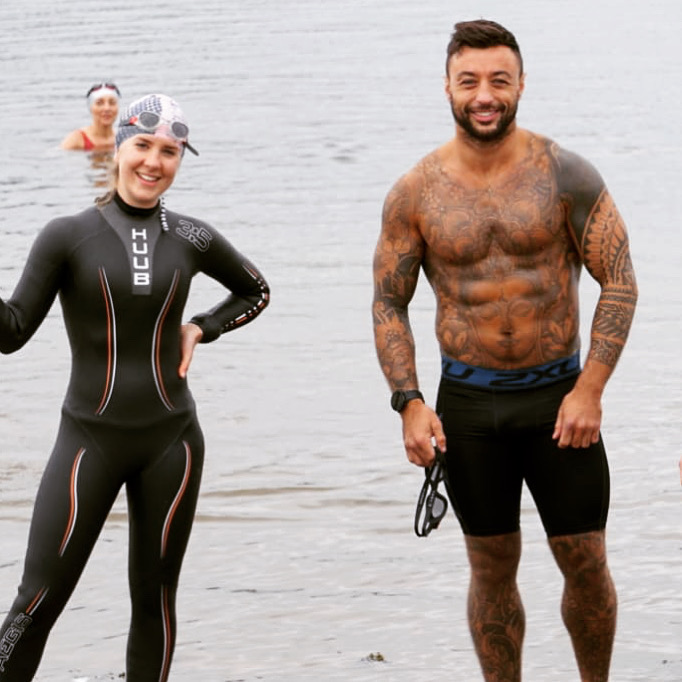
Lee trained for his Channel swim in the sea pool in Wirral
Since making that decision to train to swim the Channel, Lee noticed a dramatic improvement in his mental health.
“When I began to train, my mental health started to improve and my journey got better,” he says. “Any exercise is going to help you feel better. But with outdoor swimming and the cold water, although it’s agony and painful at the time, you feel great after when you get out; more alert, more alive. 14 months on from when I started, I was able to start talking openly about my mental health.”
From there, Lee began to focus on the challenge that lay ahead of him.
Even in normal circumstances, training to swim the English Channel is no easy feat. It is estimated that only 40% of swimmers who leave Dover make it to Calais. Throw in a global pandemic, the closure of swimming pools in March, and the mental challenges that come with training for a Channel crossing that is likely to be cancelled, and Lee’s task became all the more difficult.
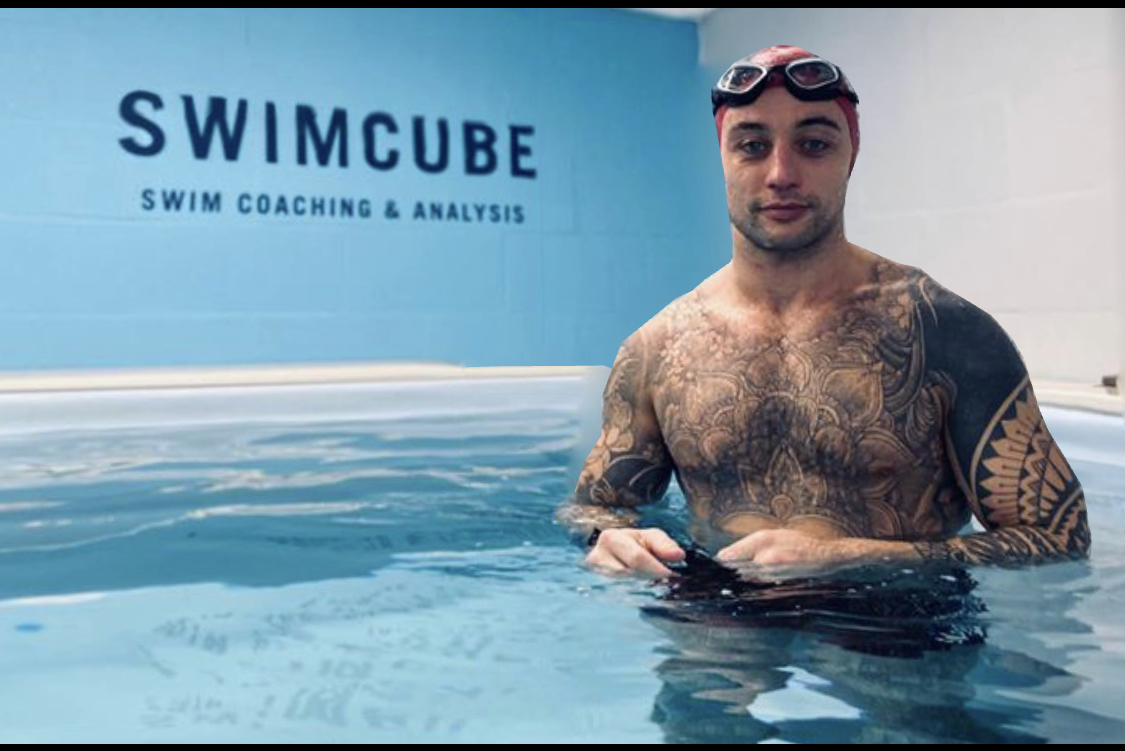
Lee sought help from Stuart Hacker from The Swim Cube to prepare him for the Channel
As he admits, after spending the first year of training “reluctantly swimming, but nowhere near enough”, Lee sought help from Stuart Hacker, owner of The Swim Cube, to improve his technique and to set up a more robust training plan. After Christmas of last year, the aim was then to acclimatise to the cold water of the Channel and to build longer swims into his training.
Unfortunately for Lee (and other Channel swimmers) the impact of the coronavirus pandemic saw his training all but come to a halt.
Lee continued to train in the sea pool in Wirral when he could, unaware of whether or not his swim would actually take place.
Despite all this, when he received the call from his pilot at the start of July to inform him that the crossing would go ahead, Lee was determined and ready to go. “I knew that even with the impact of coronavirus and the lack of training that I had the grit and determination to do it,” he says.
Stuart was also confident in Lee’s ability. Although, as a Channel swimmer himself, he was conscious of the less than ideal circumstances leading up to the swim.
“He and I would both say that it is far from ideal,” said Stuart, the week before the crossing. “I would much rather he had done more technique stuff and a lot more in the pool over winter, but he is a seriously determined guy.
“The other thing is the mental side of Channel swimming. You spend a lot of time preparing mentally for these big challenges. If even part of you in the back of your mind thinks it’s not going to happen, then that’s quite a big mental load to take on all of a sudden when a pilot phones you up and tells you that your swim is on next week.”
On Sunday 12 July, when the conditions on the Channel were at their most optimal, Lee was the first swimmer of the day to set off from Dover, excited by what he could achieve.
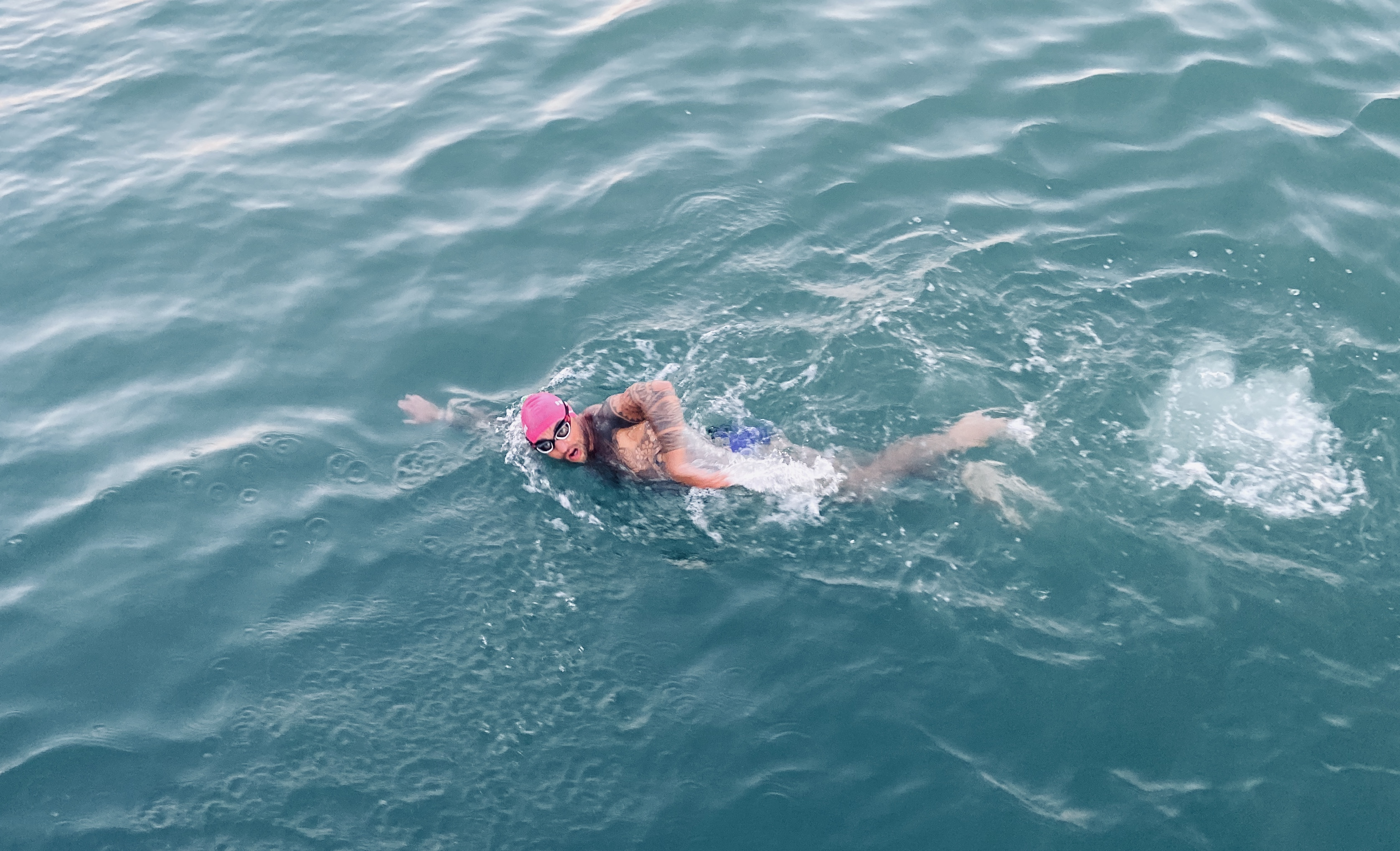
Lee was the first Channel swimmer to set off from Dover in 2020
After a steady start, five hours into the swim Lee’s crew were forced to pull him out of the water after his stroke rate slowed from 60 to 40 and he started to show signs of hypothermia.
“I don’t remember the last two hours of swimming,” he says. When I realised where I was and what had happened, I just felt disappointment really.
“Even though the odds were stacked against me, I just remember thinking that I was in such a good place mentally. I wasn’t going to be beaten; that I was unstoppable. At no point did I feel that I was going to be taken off.
“I have swum longer and in colder water, but I think I went pacing myself slower than usual because it’s such a long swim.
“I obviously knew I was going to be cold from the start because I am quite lean. I don’t carry much body fat at all, so I felt the cold from the minute I was in the water.”
When the boat returned to Dover, there was an ambulance waiting for Lee.

Lee was kept in hospital for observation with suspected hypothermia
“Hypothermia had set in by the end of the swim,” says Stuart. “He was in real trouble when we got him out of the water. It is scary when that happens, but it can and does happen quite easily.”
Lee says he has learnt some “tough lessons” about Channel swimming, but his journey is “far from over”.
The day after the swim, Lee and his team identified the strengths and weaknesses from the failed crossing, which give him plenty of areas to improve on.
“I’ve got a real fire in my belly and a chip on my shoulder now,” he says. “Initially when I swam the Channel it was to raise money and for my mental health. The outdoor swimming and cold water helped me to feel better, more alert, more alive.
“But now it’s more than just the fundraising and my mental health. I feel like I have a vendetta against the Channel. I hate being broken and it broke me.”
Stuart is confident that Lee will be back to take on the Channel soon, quoting his determination and the amount he has learnt from the experience.
Lee now plans to work on his swimming and cold-water acclimatisation over the next two years by taking part in long-distance events, with a plan to have a second attempt at the Channel in 2022.
His fundraising efforts have so far raised over £6000 for mental health charity Wirral Mind. To donate, visit Lee’s JustGiving page.
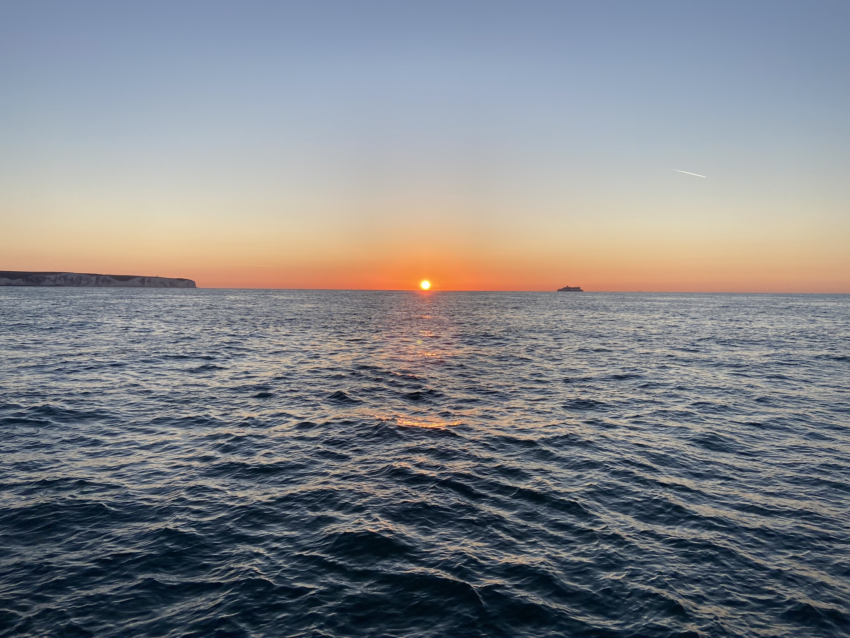
Sunrise over the English Channel






